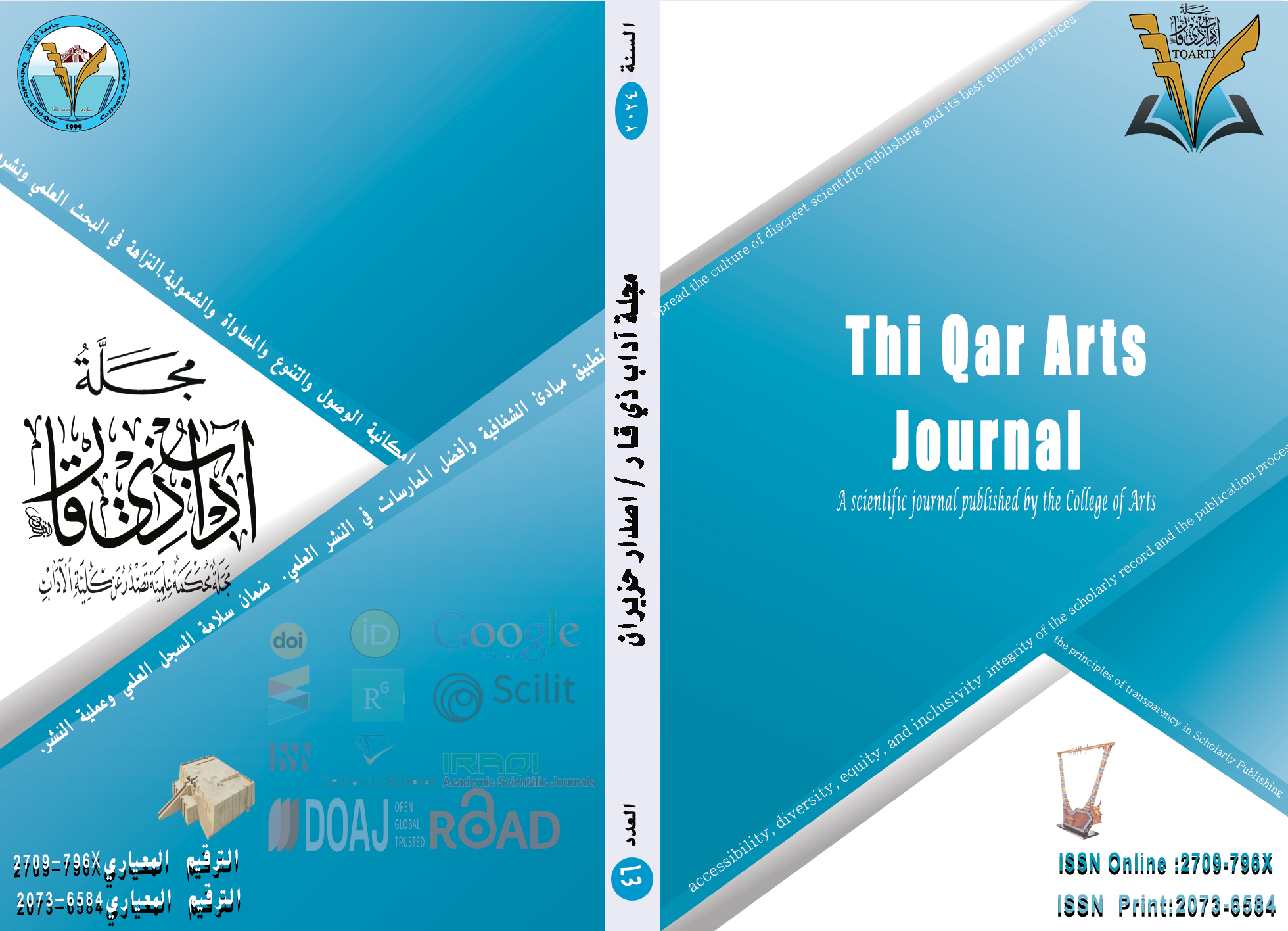Etiquette of Linguistic Behavior in Society and the Variables Controlling It: A Sociolinguistic Study
DOI:
https://doi.org/10.32792/tqartj.v5i46.604Keywords:
Linguistic Behavior - Sociolinguistics - Politeness - Linguistic Variables.Abstract
Behavior is the first thing that members of the communicative process encounter in a linguistic situation. Through it, successful communication between interlocutors is achieved, allowing both parties to attain their goals without disturbing each other, using a common language. Since the primary function of language is to facilitate communication among members of society, this function stems from the social nature of language, which is created from the collective life of individuals. Consequently, it enables individuals to fulfill their needs and desires, as language is a system shared by all members of the linguistic community.
The research aims to demonstrate the impact of behavior on communication between the parties involved in the communicative process, the formation of relationships between speakers, and the overcoming of misunderstandings. Therefore, it reveals the etiquette of linguistic behavior organized within the linguistic community and its appropriateness for the communicative event. Additionally, it focuses on the phenomena of politeness, as it indicates behavior, and the principle of cooperation, which aims to establish etiquette for linguistic behavior among interlocutors in dialogic processes, and to show the impact of variables controlling linguistic behavior etiquette.
Downloads
References
Discourse Strategies (A Pragmatic Approach): Dr. Abdulhadi bin Dhafer Al-Shahri, Dar Al-Kutub Al-Jadida Al-Muttahida (Beirut, Lebanon), 1st edition, 2003.
Cognitive and Methodological Foundations of Arabic Grammatical Discourse: Dr. Fouad Bou Ali, Irbid, Jordan, 1st edition, 2011.
The Origin of Gender Differences: Ursula Scheu, 2nd edition, Al-Hour Publishing House, Syria.
Principles of Psychology: Dr. Ahmed Ezzat, Dar Al-Kateb for Printing and Publishing, Cairo, 7th edition, 1968.
New Horizons in Contemporary Linguistic Research: Dr. Mahmoud Ahmed Nahla, Al-Adab Library, Cairo, 1st edition, 1432 AH - 2011 AD.
The Development of Pragmatics in the Second Language and How to Teach It: Saad bin Mohammed Al-Qahtani, undated.
The Development of Linguistics Since 1970: Dr. Hart Helbisch, translated by Saeed Hassan Bahiri, 1st edition, Zahraa Al-Sharq Library, Cairo, 2007.
Dialogue and Debate in the Holy Quran: Khalil Abdul Majeed Ziyada, Al-Manar Publishing House, 1st edition.
Sociolinguistics Guide: Edited by Florian Coulmas, translated by Dr. Khaled Al-Ashhab and Dr. Majdoleen Al-Nuhaibi, 1st edition, Beirut, 2009.
Arabic Morphology: Pragmatic Perspectives: Saif Al-Din Taha Al-Fuqara, Al-Yazouri Publishing and Distribution, Amman, Jordan, undated.
Arabic Linguistics: Abdul Karim Mujahid, Osama Publishing and Distribution, Jordan - Amman, 2009.
Introduction to Sociolinguistics: Dr. Kamal Bishr, Dar Gharib for Printing and Publishing, Cairo, 1997.
Sociolinguistics: Its Concept and Issues: Sabri Ibrahim Al-Sayed, Dar Al-Maaref Al-Jami’iya, undated.
General Linguistics: Dr. Abdul Sabour Shahin, Al-Risala Foundation, Beirut, 6th edition, 1413 AH - 1993 AD.
Language and Balance or Intellectual Multiplicity: Dr. Taha Abdul Rahman, Arab Cultural Center, 1st edition, 1998.
Linguistics: Origin and Development: Ahmed Momen, University Publications Office, Algeria, 2nd edition, 2005.
Language in Society: M.M. Lewis, translated by Dr. Tammam Hassan and Dr. Ibrahim Anis, Dar Ihyaa Al-Kutub Al-Ilmiyya, 1959.
Language and Society: Dr. Ali Abdul Wahid Wafi, Dar Nahdat Misr, Cairo, undated.
Language and Social Sciences: Dr. Abdu Al-Rajhi, Beirut, Dar Al-Nahda Al-Arabiya, 2004.
Lectures in Linguistics: A Knowledge Series According to Linguistics Curricula in Iraqi Universities: Dr. Khaled Khalil Howaidi and Dr. Naama Dahsh Al-Taie, 1436 AH - 2015 AD, Dar Al-Kutub wa Al-Watha’iq, Baghdad, 2014.
Introduction to Pragmatic Linguistics for Arabic Language Institute Students: Translated by Mohammed Yahain, University Books Publishing House, Algeria, undated.
Encyclopedic Dictionary of Applied Linguistics Terms: Prepared by Abdul Aziz bin Ibrahim, reviewed by Mahmoud Ismail Saleh, 1st edition, 2023.
Communication Skills: Edited by Dr. Noah bin Yahya Al-Shahri, Dr. Anmar Hamid Matawa, Dr. Saeed bin Abduh Najida, Dr. Tarek bin Said Ahmed Al-Khalifi, Prof. Dr. Abdul Moneim bin Abdul Salam Al-Hayani, Dr. Ahmed Abdullah Al-Ghamdi, 3rd edition.
Text, Discourse, and Communication: Dr. Mohammed Al-Abd.
Articles:
Etiquette of Linguistic Behavior from Taboo to Linguistic Politeness: Najwa Firan, Journal of Literature and Languages, Vol. 21, No. 1, 2021, p. 107.
Adaptation of the Khomi Test for Assessing Oral Language (ELO) to the Arabic Language Practiced in the Algerian Environment: A. Adi Dalila, Journal of Social Human Sciences, No. 26, 2016.
Linguistic Communities from the Perspective of Sociolinguistics: A Study in Concept and Research Mechanism: Dr. Abdul Qader Ali Zarouqi, Journal of the Researcher in Human and Social Sciences, No. 35, 2008.
Study of Language and Gender Differences in the Poetry of Ibrahim and Fadwa Tuqan in Light of DSL Theory: Raihana Malazada (responsible author), Farzaneh Rahimian Koushki, Raihana Yazdi, Critical Illuminations (Peer-reviewed Article), Vol. 13, No. 49, Spring 1402 SH / March 2023, p. 80.
Internet Sources:
Social Hierarchy: General Definitions and Issues: University of Tlemcen, online research, link.
Linguistic Differentiation Between Males and Females: Online article, Wikipedia.
Linguistic Behavior: A Dual Approach: Dr. Ahmed Fathallah, August 7, 2020, online research, link.
Downloads
Published
License
Copyright (c) 2024 Dr. Afrah Kazem Yasser

This work is licensed under a Creative Commons Attribution 4.0 International License.
The journal applies the license of CC BY (a Creative Commons Attribution International license). This license allows authors to keep ownership of the copyright of their papers. But this license permits any user to download, print out, extract, reuse, archive, and distribute the article, so long as appropriate credit is given to the authors and the source of the work. The license ensures that the article will be available as widely as possible and that the article can be included in any scientific archive.



















